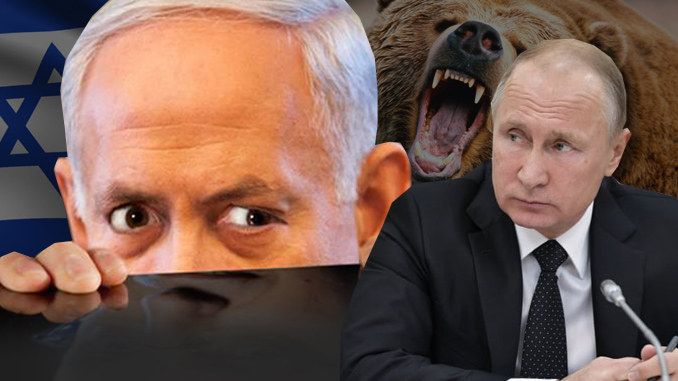
Israeli newspaper Ha’aretz warns that the Russians are back—and looking to threaten Israel.
By Richard Walker
A warning that Russia has returned to the Middle East to threaten Israel is just one of many alarming claims coming from Israel and from figures in the U.S. military who have added China to the mix.
Mor Altshuler in Israeli’s leading newspaper, Ha’aretz, has warned that Russia is back after 45 years specifically to threaten Israel, and that its expanding Russian naval presence could interrupt Israel’s energy plans in the eastern Mediterranean and hold them hostage. She also questioned the Trump administration’s commitment to Israel: “Are all the players on our side playing with clean hands? Frankly, I must say that soon I might start missing Barack Obama.”
Her warning was very much in keeping with a growing fear within the Israeli political and military establishment that there is a changing strategic environment in the eastern Mediterranean where Israel has a small coastline with the Mediterranean Sea, compared to countries it considers enemies, such as Turkey, Lebanon, and Syria.
Some believe that the Trump administration has become too isolationist, yet Israel believes it should be able to project its power into the eastern Mediterranean region, both militarily and in pursuit of claiming rights to gas fields under the sea. It is the prospect of energy riches, as much as exerting a strong military footprint that shapes Israeli opinion. However, without a strong U.S. naval presence in the region to rely on, Israel has begun to feel vulnerable, and more so since Russia has a large Mediterranean fleet based on the Syrian port city of Tartus. In comparison, Israel possesses a small naval force.
According to NATO sources, on a recent trip to Tel Aviv, National Security Advisor John Bolton got an earful from Israeli Prime Minister Benjamin Netanyahu about the threat posed to Israel by Russia and by China’s big spending to buy friends and influence in the eastern Mediterranean. Netanyahu complained that the U.S. no longer has any of its fleets based in the region and that Israel was being closed in by its enemies.
The eastern Mediterranean has taken on greater significance for Israel and for other nations in the region, especially Turkey, since the discovery of large gas deposits off the island of Cyprus, which is equally controlled by Greece and Turkey. Israel and Egypt quickly signed a deal with the Greek Cypriots and Egypt to pipe gas to Arab nations and to Europe via Greece, thereby bypassing Turkish and Russian pipelines. The Turks weren’t long in deciding that they had rights to drill for energy in the waters around Cyprus, and they announced that they even had plans for a large naval base in the north of the island. The announcement panicked the Greeks, who controlled most of Cyprus, and the Israelis. Turkey, with perhaps the largest coastline in the eastern Mediterranean, was in effect saying to Israel, “Not so fast.” It was a warning that did not go down well in Tel Aviv. The prospect of future naval clashes between Israel and Turkey quickly dampened the enthusiasm of the big U.S. and French oil giants, who were anxious to get their hands on a share of the riches by handling exploration and the building of pipelines.

While the energy issue is undoubtedly important in explaining Israel’s growing unease, there are bigger issues at play that define why Israel feels it faces an existential threat. Neocons have for some time added to Israel’s fear by claiming that the Trump administration is failing in its duty by not ordering Turkey to abandon building a large naval base on Cyprus. In fact, the Trump administration has preferred a hands-off policy. Turkey is, after all, a NATO member, and it has a right to build a base if it wishes. There is no indication that the Trump White House has any desire to intervene no matter how much Israel is pressing for action.
The critical issue driving Israeli fears is that it cannot manipulate Russia. It therefore sees the alignment of Russia with Turkey, Syria, Lebanon, Iraq, and Iran a serious threat to its power. But that aside, there is also the agenda of some in the ranks of the U.S. military who feel that Russia and China have an agreed strategy across the Middle East. Commander Tony Chavez, a member of the globalist group Chicago Council on Global Affairs, argues that Russia is determined to control the region, as evidenced by the fact that in September 2018 it held the largest Mediterranean naval exercise since the Cold War. He also points to China’s growing use of ports across the eastern Mediterranean as part of a new policy to confront U.S. power.
While Israel and its neocon backers in Washington press for a return of a powerful U.S. naval presence in the eastern Mediterranean, it seems that, for now, that is not going to happen.
Richard Walker is the pen name of a former N.Y. news producer.




Typical Israeli attitude. Israel causes widespread subversive and military aggression throughout the Middle East(and beyond). But acts like the put-upon child in the school yard, when countries, fed up with their actions, turn against them.